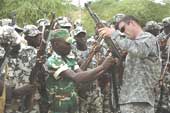Counterterrorism's blindness: Mali and the US

With the US intent on continuing its funding for counterterrorism efforts against 'al-Qaeda' in Mali, Vijay Prashad argues that blindly channelling funds to the Malian military might well lead to the country going 'the way of Guinea'. Washington's focus is entirely on counterterrorism efforts, Prashad stresses, with the military support on offer to Mali dwarfing that available for development while enabling former military general and current President Amadou Toumani Touré to consolidate his power.
Tucked away in the corners of the news media sits a report that the US government will provide US$5 million in trucks and military equipment to Mali. The aim of this donation is to help the Malian military fight the group known as al-Qaeda in the Islamic Maghreb (AQIM). Last December, AQIM kidnapped two Canadian diplomats, who were released after four months. This is what they do these days: kidnap, extort, run guns and drugs. Islam is a veneer.
AQIM comes out of the brutal Algerian civil war (1991–2002), which took the lives of over 200,000 people, and was fought between the secular–authoritarian National Liberation Front and various Islamist factions. The war ended when the Islamists lost the armed conflict. A few hardened veterans turned to the Salafist Group for Preaching and Combat in the late 1990s, and this group became the AQIM (adopted into the al-Qaeda fold by its junior amir, Ayman al-Zawahiri, in 2006). AQIM conducted a few spectacular operations, including the kidnapping of tourists, the bombing of Algerian military vehicles and suicide bombing. AQIM's leadership comes from that well-known class of jihadi graduates known as the 'Afghan Arabs', people like Abu Musab Abdul Wadoud (Abdelmalek Droukal), who did his time in Afghanistan.
The association with al-Qaeda is a propaganda coup, with Wadoud telling The New York Times that the link not only strengthens their sense of theological unity, but it also brings 'grief and sorrow to our enemies'. This is bluster. AQIM is a small shop with a large sign, paying its franchise dues without increasing its own business. But since AQIM operates on the border between Algeria and Mali, and does some of its business in Mali, the US government decided to help fortify Mali's military. US$5 million is not much money for the US, but for a country with total revenues of US1.5 billion, with a military budget of about US$70 million per year, this small disbursement is considerable. And it is set to increase – keep an eye on that.
The US government has worried that the turmoil in Algeria would spread across the Sahara into places such as Mali. In 2002, the Bush administration set up the Pan Sahel Initiative (PSI), which became, in 2005, the Trans-Sahel Counterterrorism Initiative (and later Partnership, the TSCTP). The point was to take the military forces from the seven 'willing' Saharan countries and train them to fight their various foes, some of whom might be offshoots of al-Qaeda (AQIM, however, was not formed till 2006, when this military interchange was already fairly advanced). With the trans-Sahel project, the US government put in US$500 million over five years, mainly for military hardware, as if the militaries of Ghana and Nigeria, which joined up, need more funds.
Through the TSCTP, the US government wanted not only to fight the Islamists on the battlefield, but also take on their extremist ideology. To this end, USAID got some funds to help revise textbooks, pay for schools that teach a 'tolerant ideology' and run rural radio stations 'by broadcasting moderate views and providing information on government services'. The money for these non-military functions was available in 2005 and 2007, but not in 2006. Because of this fluctuation, according to the General Accounting Office of the US government, 'the mission suspended its peace-building program in northern Mali'.
All attention was focused on the military aspect, although even here there is some uneasiness. The US Embassy in Bamako was quick to point out that the US$5 million for trucks and other military hardware comes not from the US military, but from the US State Department. Although, the State Department is not the only one involved; from April to June this year, 300 US Special Forces 'advisers' trained the Malian military at three of its bases. These Sahelian initiatives are now run through AFRICOM, the US African Command, set up in October 2007. It operates a programme called 'Joint Task Force Aztec Silence'. The Cowboys are playing Cortés in the desert. The 'silence' after Aztec is chilling.
The insurgents in northern Mali are various. The longest tension is between the Malian government and the 'Tuareg rebels'. The Tuaregs are the Berber nomads of the Sahara, who live across the boundaries of the countries that make up northern Africa. Known as the 'Blue Men of the Desert' for their indigo robes, the Tuaregs have faced a challenge to their independence and to their livelihood. The former has come from the attempt first by the colonial states and then by the new national states to integrate them into the state structure (and to fix international borders, at which the Tuaregs scoff). The latter came from a century long deterioration of the land around the desert, of the long drought that has changed the Tuaregs' ability to conduct their form of pastoralism (this is one of the major problems that effects Darfur, as has been so keenly brought out by Mahmood Mamdani in , New York: The New Press, 2007, which was chosen for the Muzaffar Ahmad Book Award, 2009.
* Please send comments to [email protected] or comment online at Pambazuka News.
